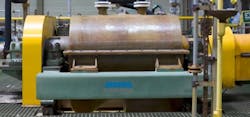Lubrizol, a highly advanced chemicals manufacturer, was experiencing severe corrosion in the case of one of its decanter centrifuges. In theory, the centrifuge’s titanium grade 2 case and rotating assembly should have been able to withstand the hydrochloric acid that passed through the centrifuge. However, changing process conditions (elevated temperatures and concentrations) were causing substantial corrosion problems and increasing maintenance costs. In addition to meeting its functional criteria, Lubrizol needed a solution that was:
- safe under all operating conditions despite high operating speeds, which generate a force that could release large particles at a lethal velocity if they were to penetrate the case;
- a cost-effective alternative; and
- more resistant to the highly corrosive chemicals used in the separation process.
The customer turned to its local Andritz Separation partner for an answer to these challenges. Working with Plasticon Europe B.V., Netherlands, and Lubrizol Advanced Materials Resin B.V., Netherlands, Andritz Separation has developed an innovative solution using fiberglass-reinforced plastic (FRP).
Solution
Robust and chemically resistant, FRP proved in initial calculations to be cost-effective compared to titanium. But was it strong enough?
Having reached the limits of analytical calculations, it was clear that a new type of safety test was needed—one that would simulate large solids and/or wear elements coming out of the centrifuge at extreme velocities, but without putting anyone at risk. The answer was found in the most unlikely of places: a shooting range. An FRP construction, resembling the eventual shielding material, was used as a target, and specially designed ammunition was fired at the target to replicate the trajectory of the potentially dangerous materials. After shooting, measuring and investigating the results, it was proven that projectiles moving at six times the speed of any part coming from the centrifuge could not penetrate the 10-mm-thick FRP construction. Even projectiles fired multiple times at the same impact area did not penetrate the target. This proves that the safety of the surrounding personnel and this equipment could be guaranteed with an FRP centrifuge case.
Results
The excellent teamwork between Lubrizol, Plasticon and Andritz Separation resulted in an entirely new and innovative application for FRP. Used for a decanter centrifuge case, the material enabled safe and reliable operations while allowing substantial savings for the customer in terms of purchasing and maintenance costs. Two years after installation, the case is still in excellent condition, reducing downtime by 100 hours annually. As an added bonus, the plastic case makes far less noise than the titanium metal case it replaced.
